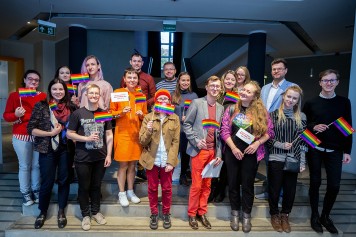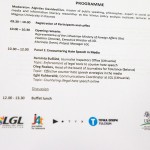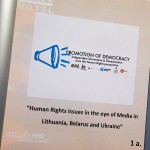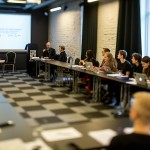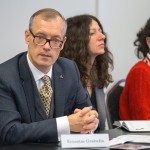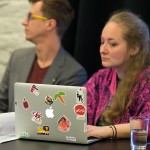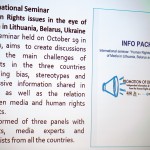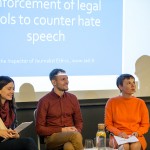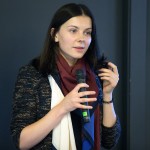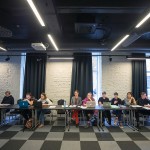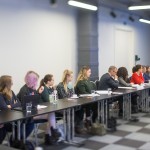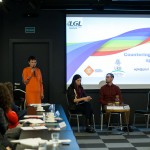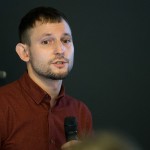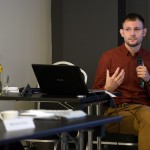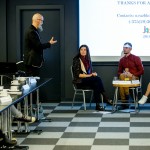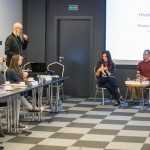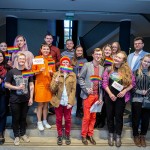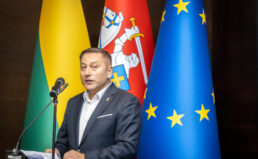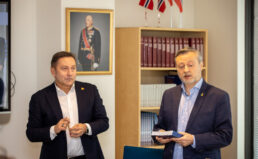On October 19, 2018, the National LGBT rights organization LGL organized a unique international seminar where participating researchers, experts and public opinion leaders had the opportunity to discuss the main challenges faced by human rights activists in Lithuania, Belarus and Ukraine. During the seminar, participants discussed the impact of hate speech, propaganda and other forms of aggressive information on the human rights discourse in the countries.
The LGBT human rights activists from Lithuania, Belarus and Ukraine gathering in Vilnius for the international seminar received a special support from the Ministry of Foreign Affairs of the Republic of Lithuania and a congratulatory speech from Ernestas Grabažis, advisor of the United Nations, International Organizations and Human Rights Department at the Ministry of Foreign Affairs.
Without the funds from the Lithuanian Development Cooperation program, it would have not been possible to continue the cooperation between LGBT rights organizations in Lithuania, Belarus and Ukraine under the project “Promotion of democracy – independent information dissemination from the Human Rights perspective”, which has already become an example of good practices.
Congratulating the guests gathered at the event, the Executive Director of the National LGBT rights organization LGL Vladimir Simonko emphasized that the project contributes to the implementation of the European Commission’s Action Plan to protect the LGBTI people rights by promoting human rights and political dialogue in third countries.
Hate speech in the media and social networks
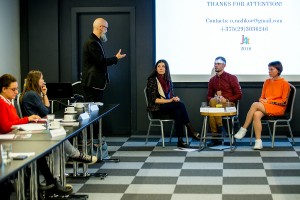 During the first part of the seminar, Raminta Bučiūtė, Chief specialist (law) of the Inspector of Journalist Ethics, Eglė Kuktoraitė, the communications manager at LGL, and Oleg Rozkov, head of the Board at the Journalists for Tolerance in Belarus, presented effective ways of fighting hate speech, false news and propaganda in the media and social networks.
During the first part of the seminar, Raminta Bučiūtė, Chief specialist (law) of the Inspector of Journalist Ethics, Eglė Kuktoraitė, the communications manager at LGL, and Oleg Rozkov, head of the Board at the Journalists for Tolerance in Belarus, presented effective ways of fighting hate speech, false news and propaganda in the media and social networks.
The representative from the Office of the Inspector of Journalist Ethics Raminta Bučiūtė presented to the seminar participants the Office’s work on public information monitoring and analyzing and on providing expert opinions on hate speech cases in public space. In 2017 alone, the Office of the Inspector of Journalist Ethics has delivered 20 expert opinions on the hate speech cases to the Lithuanian Prosecutor’s Office. Many of the hate speech cases were inciting hate and violence based on sexual orientation.
Eglė Kuktoraitė, communications manager at LGL, emphasized that there is no uniform definition of hate speech at European Union level. For this reason, there are also different ways of dealing with hate speech in different areas of media. Although the news portals operating in Lithuania are legally obliged to moderate comments under current legislation, Facebook, Twitter, Instagram and YouTube, which are based in the United States, are not required to do so and they are using their own community standards.
To resolve the problem, the European Commission has initiated a Code of Conduct on countering illegal hate speech online, which was signed by the aforementioned social networking sites in 2016. A number of institutions and human rights organizations operating in the European Union, including the National LGBT rights organization LGL, soon joined the initiative. Having recognized that the organizations representing the interests of the communities vulnerable to various hate speech forms are the most capable of detecting cases of hate speech in different countries, social networking companies has given them the status of ‘trusted flagger’. This means that if an organization reports a case of hate speech to one of the social networks that have joined the Code of Conduct, they are obliged to remove the infringing comment or message within 24 hours.
In Belarus, in the absence of hate speech and hate crime fighting legislation, non-governmental organizations are limited to raising public and journalistic awareness about the effects of hate speech. Participating in the seminar, Oleg Rozkov, head of the Board at the Journalists for Tolerance, presented to the event participants a tool created for the organization’s journalists that can be used to quickly and effectively check a written text for any improper use of words.
LGBT human rights in Lithuania, Belarus and Ukraine
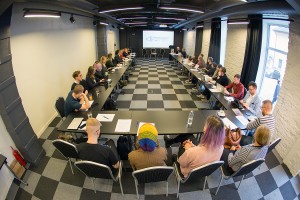 In the second part of the event, Director of the Belarusian organization DOTYK Ana Lok, the programmes director from the National LGBT rights organization LGL Eduardas Platovas, and the Executive Director of the Ukrainian organization FULCRUM Tymur Levchuk talked about LGBT human rights challenges in their respective countries.
In the second part of the event, Director of the Belarusian organization DOTYK Ana Lok, the programmes director from the National LGBT rights organization LGL Eduardas Platovas, and the Executive Director of the Ukrainian organization FULCRUM Tymur Levchuk talked about LGBT human rights challenges in their respective countries.
Although LGBT human rights activists in Lithuania, Belarus and Ukraine face similar challenges, such as hate speech and hate crime, the police officers’ sluggishness to investigate such incidents, homophobic, biphobic and transphobic legislative proposals, and various limitations on the freedom of speech and expression faced by LGBT community members, LGL’s programmes director Eduardas Platovas emphasized that the situation in Lithuania is particularly aggravated by the Law on the protection of minors against the detrimental effect of public information, that sees any information “which promotes forms of marriage and family building other than those established in the Constitution and the Civil Code of the Republic of Lithuania” as “harmful to minors.”
The aforementioned law have already been used three times against the LGBT community. The fact that the law is in force in the country implies that the LGBT human rights discourse is seen as ‘harmful’, it restricts LGBT activists’ freedom of speech and expression, and discourages educational activities in schools where the problem of homophobic, biphobic and transphobic bullying is very acute.
According to Tymur Levchuk, the head of FULCRUM, the LGBT community in Ukraine has become increasingly visible in the society. The country’s first community of officers belonging to the LGBT community has recently been established, business representatives are increasingly seeking to promote diversity and openness in the workplace, and a transgender singer has participated in a popular musical show Voice. Nevertheless, Ukrainian society still has a negative attitude towards LGBT people, and many hate crimes remain not investigated.
How different forms of aggressive information impact the public discourse?
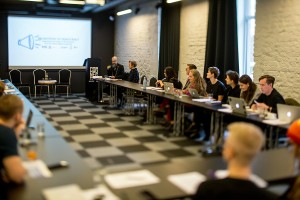 Participating in the third part of the seminar, lawyer Evelina Dobrovolska, the director of the Lithuanian Center for Human Rights Birutė Sabatauskaitė, and FULCRUM’s communications and fundraising manager Yana Tovpeko tried to answer the question of how different forms of aggressive information, such as hate speech, propaganda and fake news, affect public opinion and how human rights activists can resist negative effects of aggressive information.
Participating in the third part of the seminar, lawyer Evelina Dobrovolska, the director of the Lithuanian Center for Human Rights Birutė Sabatauskaitė, and FULCRUM’s communications and fundraising manager Yana Tovpeko tried to answer the question of how different forms of aggressive information, such as hate speech, propaganda and fake news, affect public opinion and how human rights activists can resist negative effects of aggressive information.
Evelina Dobrovolska, a lawyer working with hate speech, hate crimes and legal gender change for transgender people, has emphasized that complaints to the Prosecutor’s Office concerning cases of hate speech have fallen sharply in numbers due to new measures implemented by the main national news portals. Users have the ability to report inappropriate comments and are needed to confirm their identity before posting a comment. Collaboration between non-governmental organizations and law enforcement has also contributed to the reduction of hate speech.
According to the lawyer, it is necessary to monitor the public space for possible cases of hate speech, to report them to law enforcement, and to not forget to inform the public about the course of investigations. Evelina Dobrovolska also emphasized that, after experiencing a hate crime, it is recommended to contact a lawyer because police officers do not always take into account the motives of the crime. Without receiving justice, human rights activists sometimes have no choice but to protest.
In turn, Yulia Tovpeko, the head of communications and fundraising for FULCRUM, presented a study on hate speech and bullying on social networks conducted in Ukraine. According to the study, human rights activists are more likely to encounter hate speech, bullying and threats compared to other groups.
Joining the discussion, Birutė Sabatauskaitė, the director of the Lithuanian Center for Human Rights emphasized that although human rights activists tend to work without rest and often question the importance of their work, it is especially important to find time for themselves and for encouraging each other, and to enjoy the many small victories human rights activists has achieved in recent years in Lithuania.
This article has been produced under the framework of the project “Promotion of democracy – independent information dissemination from the Human Rights perspective”, funded by Lithuania’s Development Cooperation Programme.

